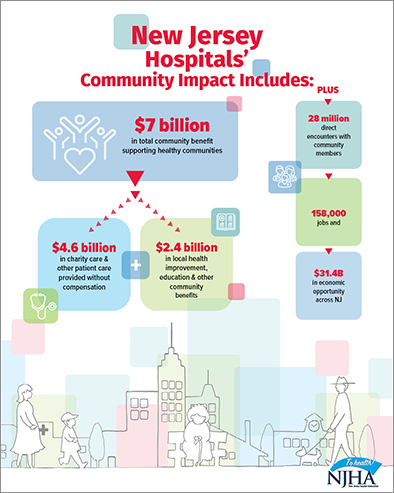
N.J. hospitals care for patients in 15 million visits annually, dispensing nationally ranked healthcare services 24/7. Their commitment to a healthy New Jersey also extends beyond hospital walls, including more than $7 billion to support health and well-being in the community.
The commitment from New Jersey’s hospitals include efforts helping residents improve their health and combat poverty by providing basic needs like housing assistance, healthy foods and transportation; delivering health education and training for families and professionals; donating the use of facilities for community organizations; employees volunteering in the community, as well as providing financial support.
This investment in healthy communities is detailed in the new report Health & Hope: The Community Impact of New Jersey Hospitals, from the New Jersey Hospital Association. In 2023 – the most recent data available – these contributions included:
- $4.6 billion in charity care and other patient care provided without compensation
- $2.4 billion in local health improvement and community programming that addresses needs such as food access, housing, transportation, education and preventive services.
These community benefits are shaped by community health needs assessments performed by hospitals to meet the most pressing local needs in the communities they serve.
“New Jersey hospitals are committed to caring for the whole patient – and that includes the social and societal circumstances that impact their health,” said NJHA President and CEO Cathy Bennett. “It’s a pledge not just to that patient in a hospital bed, but to the health of the surrounding community. This investment makes a deep impact on individual lives, while also shaping who we are as a state.”
All told, about 20 cents of every hospital dollar went toward addressing vital community health needs in 2023.
Hospitals’ community impact includes:
- access to care for vulnerable populations, working-class families and the uninsured
- programs to address food access, stable housing, transportation and safe communities
- health screenings, immunization clinics and community-based mental health resources
- workforce development and employee wellness to support the healthcare workforce and develop future healthcare workers
- community education and learning that promotes healthy behaviors and increases health literacy so patients can be more informed about their healthcare
- innovation that brings leading-edge care and clinical trials to our state
- a commitment to global issues such as environmental stewardship and sustainability.
While not included in the $7 billion community benefit total documented by the U.S. Internal Revenue Service, hospitals also deliver jobs and economic opportunity that lift individuals and entire communities. N.J. hospitals provide nearly 160,000 jobs and $31.4 billion in direct economic impact. For every $1 that a hospital spends on services to patients, $2.24 ripples throughout the rest of the economy – for a total impact of 347,000 jobs across multiple industries and $70 billion in economic activity.
“A healthier New Jersey means access to quality care, the daily needs to grow and thrive and jobs that provide security and opportunity – along with building healthier communities by addressing the social determinants of health that lead to positive health outcomes,” said Bennett. “With $7 billion in community health investments and $31.4 billion in economic impact, our hospitals demonstrate their vital role in achieving the greater good.”
Find NJHA’s Community Impact report at www.njha.com/community-impact-report/.